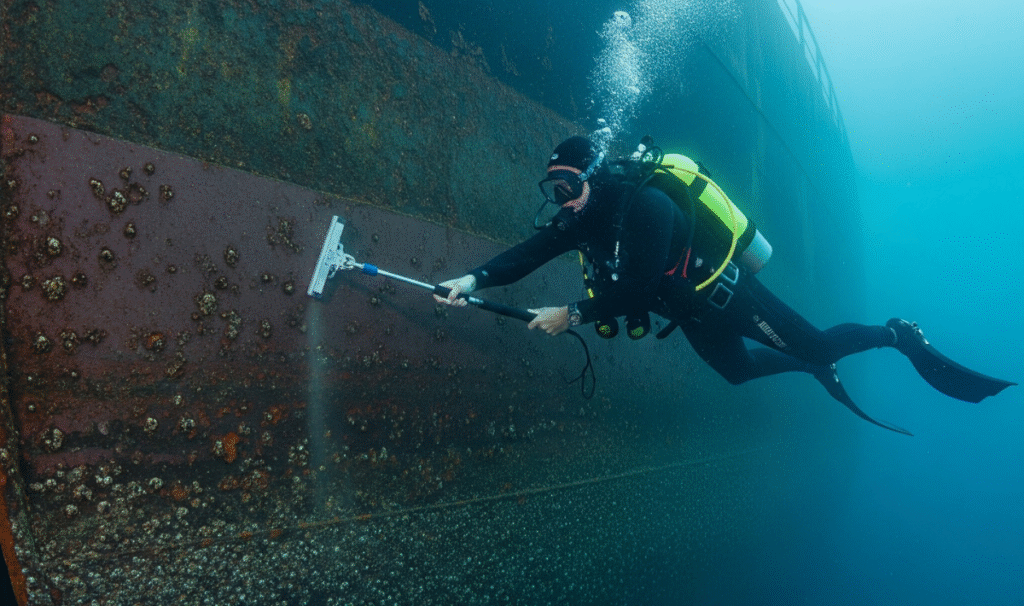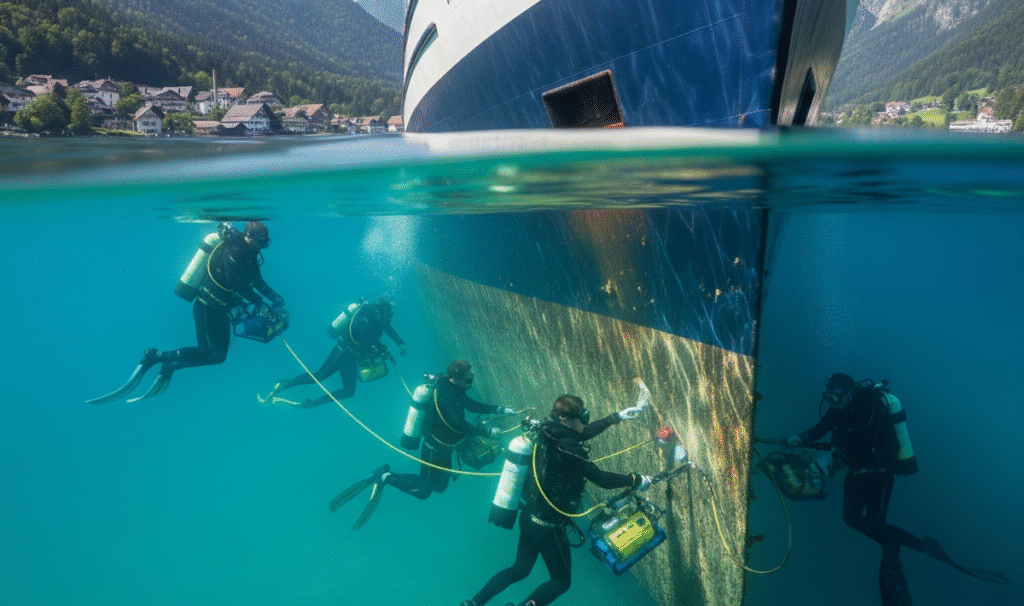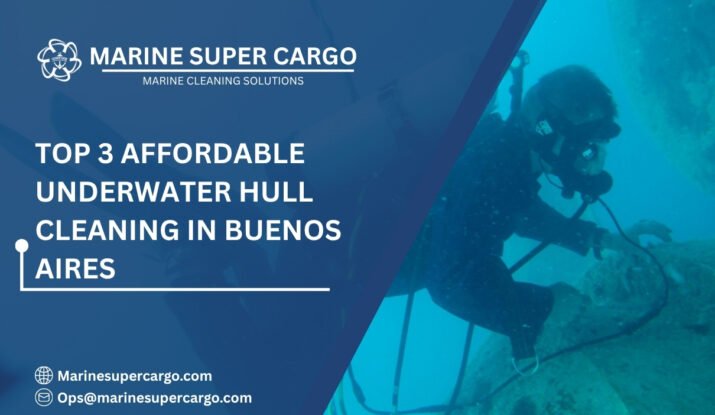Imagine your vessel trying to cut through water while dragging a thick layer of seaweed on its belly. No matter how powerful the engine, marine growth can slow a ship just like heavy boots hinder a marathon runner. For those managing fleets in Argentina’s busiest port, underwater hull cleaning in Buenos Aires isn’t just a routine task; it’s a powerful advantage for efficiency, compliance, and sustainability.
In this comprehensive, conversational guide, we’ll explore all aspects of underwater hull cleaning in Buenos Aires: from technical procedures to regulations, environmental benefits to cost savings, and the innovations shaping the future. Get ready to make your ships leaner, greener, and more profitable than ever.
Why Underwater Hull Cleaning in Buenos Aires Matters
Buenos Aires is South America’s maritime powerhouse. With heavy vessel traffic, its waters are a hotbed for marine growth—algae, barnacles, and mussels—clinging relentlessly to every hull. Without regular underwater hull cleaning in Buenos Aires, ships become sluggish and expensive to operate. Routine cleaning ensures vessels glide smoothly into port, ready for their next journey, while protecting profitability and meeting the city’s high environmental standards.
The Hidden Problem: Understanding Hull Fouling
Hull fouling is the unseen menace beneath the waves. It comes in two forms:
- Soft fouling: Slime and algae that coat hulls and can be removed fairly easily.
- Hard fouling: Shells, barnacles, and other encrustations that require more aggressive action.
Unchecked, hull fouling can increase drag by 30%, causing higher fuel burn and frequent repairs. It’s like driving your car with flat tires—inefficient and costly. Regular underwater hull cleaning in Buenos Aires clears away this burden, saving fuel and helping ships maintain optimal schedules.

How Underwater Hull Cleaning in Buenos Aires Works
Assessment
Before cleaning, teams—often divers or ROV operators—perform an underwater survey using cameras to evaluate fouling and inspect paint condition. Documentation is vital for compliance and insurance.
Cleaning and Tools
Certified specialists use:
- Rotary brushes and water jets: To remove algae and barnacles.
- Hydraulic scrapers and robotic units: For stubborn, hard fouling in high-traffic areas.
Many use containment systems or vacuums to capture debris, keeping Buenos Aires’ busy port waters clean and compliant with global standards.
Post-Cleaning Inspection
A post-cleaning review ensures that coatings remain intact and all fouling has been removed. Photo or video documentation is often shared with owners, insurers, and authorities for transparency.
Compliance: The Regulatory Picture
Ship owners in Buenos Aires must navigate strict regulations, including:
- IMO Biofouling Guidelines: To minimize the spread of invasive species and maintain safe, transparent underwater cleaning practices.
- MARPOL Annex I & V: Focusing on pollution control and responsible debris handling, with proper documentation of all cleaning events.
- Port Authority Rules: Buenos Aires mandates certified teams and compliance documentation after every underwater hull cleaning.
Choosing a service that follows these global standards is key—look for companies certified by organizations such as IMCA, IMO, and local regulatory bodies.
Environmental Impact: Ships Cleaning Up Their Act
Every time you commission underwater hull cleaning in Buenos Aires, you help protect local marine life. The environmental gains are significant:
- Reduced emissions: Clean hulls lower fuel consumption and cut greenhouse gas output.
- Biosecurity: Removal and containment systems help prevent the transfer of invasive organisms.
- Cleaner port waters: Debris is captured, not released, preserving the Río de la Plata ecosystem for local fisheries and recreation.
It’s a win-win for the environment and the shipping industry.
Beyond Compliance: Cost-Saving Power of a Clean Hull
Fuel accounts for a giant slice of any ship’s operating budget. Fouling-induced drag silently increases consumption on every voyage. Regular underwater hull cleaning in Buenos Aires delivers:
- Fuel savings of 10–30% per voyage.
- Extended intervals between major dry-docks, saving time and money.
- Fewer unplanned maintenance events and greater reliability for tight shipping schedules.
- Protection for costly anti-fouling hull coatings, helping them last longer.
For operators, the savings quickly swell into thousands of dollars per year per vessel.
Read more on underwater hull cleaning in Argentina and the synergy between national policies and Durrës’ maritime initiatives.
Cutting-Edge Innovations in Buenos Aires
Hull cleaning is evolving fast—no longer just divers with brushes:
- Robotic and ROV systems: Automated tools deliver faster, safer, and more efficient cleaning.
- AI prediction models: Hull sensors track fouling buildup, letting you clean only when needed.
- Eco-friendly cleaning pads: Protect hull coatings while maximizing dirt removal and minimizing pollution.
Buenos Aires is home to several providers adopting these technologies, meaning underwater hull cleaning in Buenos Aires is getting smarter, quicker, and greener every year.
Risk Management and Best Practices
Quality matters as much as frequency. Poor hull cleaning can damage coatings or pollute local waters. Play it safe with these best practices:
- Only hire certified, experienced teams familiar with port and international rules.
- Require inspection reports and cleaning logs for audits and claims.
- Ask about waste containment—responsible providers capture fouling debris for disposal, not discharge.
- Pair hull cleaning with propeller polishing for maximum efficiency in Buenos Aires’ challenging currents.
Your Blueprint: Smart Scheduling for Ship Owners
To make the most of underwater hull cleaning in Buenos Aires:
- Keep a hull performance log—track speed, fuel burn, and maintenance issues.
- Schedule cleaning in sync with port stays, minimizing operational disruptions.
- Take advantage of local services for rapid response and technical backup during emergencies.
Think of hull cleaning as preventive medicine for your vessel—an investment that pays for itself.

The Future: Where Underwater Hull Cleaning in Buenos Aires Is Headed
Tighter environmental regulations and rising fuel costs are steering the shipping industry toward more frequent and more advanced hull maintenance. Look for:
- Greater automation, with robotics and AI-driven monitoring.
- Stricter debris regulations—waste capture will soon be universal.
- More data-driven preventive care—making cleaning part of an overall hull management strategy for every fleet in Buenos Aires.
Ships with the cleanest hulls will be faster, cheaper to run, and more attractive to partners and ports worldwide.
Conclusion
Underwater hull cleaning in Buenos Aires blends maritime tradition with today’s mandate for efficiency, compliance, and environmental care. Regular cleaning means smoother sailings, cleaner oceans, lower operating costs, and a reputation as a responsible operator in Argentina’s vital shipping hub. By prioritizing smart, proactive maintenance, you safeguard your fleet’s performance, your bottom line, and the seas we all depend on. Partnering with specialists like CleanShip.co ensures every cleaning meets international standards, delivering reliable results, sustainable practices, and long-term value for ship owners and operators.
Read also: Underwater hull cleaning in Albania and how national policies align with Durrës’ local efforts.


